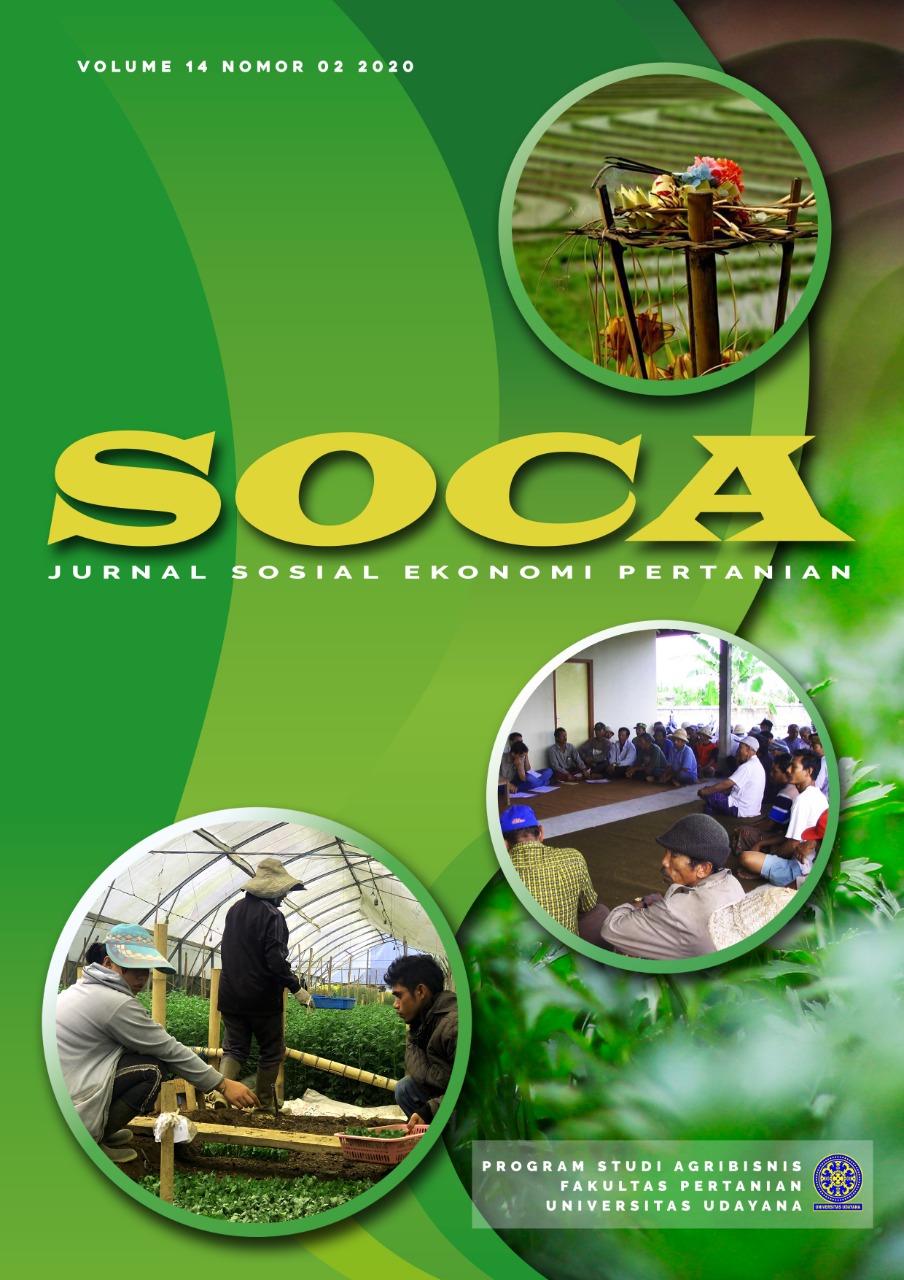Sensitivity and Feasibility Analysis of Citronella Oil Business
Abstract
Today, citronella essential oil business in Indonesia is fronting two major problems: a diverse range of product quality and fluctuated price. Meanwhile, the global market demand keeps increasing until 3–5% per year. This fact indicated that the citronella essential oil business was having a high chance of participating in the global market. This study aimed to analyze the citronella essential oil business feasibility as a “people-oriented-economy” activity and determine variables that affected the feasibility in implementing this business. Citronella essential oil is produced by a steam distillation process with a production capacity of 2,400 kg/year. The number of citronella essential oil international product sales was reaching 76% with the selling price of IDR 360,000/kg and reaching 24% on the local market with the selling price of IDR 180,000/kg, therefore the total of sales in 300 days/year was IDR 7,360,320,000. Based on this calculation the total of profit obtained in a year was IDR 99,463,383. An effort through managing the material and selling price sensitivity already done to maintain the BEP and B/C values. The increasing price was anticipated by managing the product selling price fraction, while the decreasing of the selling price anticipated by managing the market fraction.
Downloads
References
Agustian, E., Sulaswatty, A., Tasrif, Laksmono, J. A., & Badria, I. (2007). Pemisahan sitronelal dari minyak sereh wangi menggunakan unit fraksionasi skala bench. Jurnal Teknologi Industri Pertanian, 17(2), 49–53.
Alighiri, D., Eden, W. T., Supardi, K. I., Masturi, & Purwinarko, A. (2017). Potential Development Essential Oil Production of Central Java, Indonesia. Journal of Physics: Conference Series, 824, 12021. https://doi.org/10.1088/1742-6596/824/1/012021
Bimantio, M. P., & Saragih, D. P. P. (2018). Benefisiasi Prarancangan Proses Pengolahan Pupuk Granul Slow Release Dari Urea Dan Zeolit. In A. W. Krisdiarto, Y. Wijayanti, & Y. Allanto (Ed.), Prosiding Seminar INSTIPER Tahun 2018 Perkembangan Penelitian INSTIPER dalam Menanggapi Era Teknologi Maju Bidang Perkebunan I (hal. 103–115). Yogyakarta: INSTIPER Press.
Cassel, E., & Vargas, R. M. F. (2006). Experiments and Modeling of the Cymbopogon winterianus Essential Oil Extraction by Steam Distillation. Journal of the Mexican Chemical Society, 50(3), 126–129.
Damanik, S. (2007). Analisis ekonomi usaha tani serai wangi: Studi kasus Kecamatan Gunung Halu, Kabupaten Bandung Selatan. Buletin Littro, 18(2), 203–221.
Depperindag. (2002). Data statistik ekspor/impor komoditi lain-lain (essential oil). Jakarta: Departemen Perindustrian dan Perdagangan.
Direktorat Jendral Perkebunan. (2013). Statistik perkebunan Indonesia 2012–2014: Tanaman Semusim. Jakarta: Departemen Pertanian.
Feriyanto, Y. E., Sipahutar, P. J., Mahfud, M., & Prihatini, P. (2013). Pengambilan Minyak Atsiri dari Daun dan Batang Serai Wangi (Cymbopogon winterianus) Menggunakan Metode Distilasi Uap dan Air dengan Pemanasan Microwave. Jurnal Teknik ITS, 2(1), 32–38. https://doi.org/http://dx.doi.org/10.12962/j23373539.v2i1.2347
Hanafi, M., & Artanti, N. (2019). Sintesis Turunan Minyak Serai Wangi Sebagai Bahan Baku Obat. In Quo Vadis Minyak Serai Wangi dan Produk Turunannya (hal. 146). Jakarta: LIPI Press.
Ketaren, S. (1985). Pengantar Teknologi Minyak Atsiri. Jakarta: Balai Pustaka.
Lutony, T. L., & Rahmayati, Y. (2002). Produksi dan perdagangan minyak asiri (4 ed.). Depok: Penebar Swadaya.
Masada, Y. (1976). Analysis of essential oils by chromatography and mass spectrometry. New York: John Wiley & Sons, Inc.
Muhammad, H. H., Hasfalina, C. M., Hishamuddin, J., & Zurina, Z. A. (2012). Optimization and Kinetics of Essential Oil Extraction from Citronella Grass by Ohmic Heated Hydro Distillation. International Journal of Chemical Engineering and Applications, 173–177. https://doi.org/10.7763/IJCEA.2012.V3.181
Paimin, F. R., & Yunianti, I. (2002). Pasar ekspor tunggu serai wangi. Trubus, 67–68.
Sastrohamidjojo, H. (2002). Kimia Minyak Atsiri. Yogyakarta: FMIPA Universitas Gadjah Mada.
Setiawan, A. A. R., Lestari, A. D., & Abimanyu, H. (2019). Manajemen Pengembangan Usaha Minyak Serai Wangi Berbasis Teknologi. In Quo Vadis Minyak Serai Wangi dan Produk Turunannya (hal. 158). Jakarta: LIPI Press.
Sulaswatty, A., Abimanyu, H., & Syahbana Rusli, M. (2019). Menelusuri Jejak Minyak Serai Wangi. In Quo Vadis Minyak Serai Wangi dan Produk Turunannya (hal. 1–12). Jakarta: LIPI Press.
Sulaswatty, A., & Adilina, I. B. (2019). Minyak Serai Wangi dan Potensinya. In Quo Vadis Minyak Serai Wangi dan Produk Turunannya (hal. 13–42). Jakarta: LIPI Press.
Timmerhaus, K. D., & Peters, M. S. (1991). Plant design and economics for chemical engineers. New York: McGraw-Hill.
UNIDO, & FAO. (2005). Herbs, Spices, and Essential Oils. https://doi.org/10.1002/9780470113554.ch11
Virmani, O. P., & Datta, S. C. (1971). Essential oil of Cymbopogon winterianus (oil of citronella, Java). In Flavour industry.













